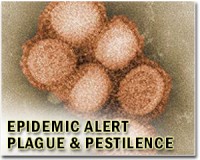| . |  |
. |
San Juan (AFP) Feb 17, 2011 Promising advances have been made in the testing of possible vaccines to prevent the mosquito-borne dengue virus, which kills 25,000 people every year, researchers said Thursday. "We have some very exciting leads on different types of vaccines that are in various stages of clinical trial that hopefully can be implemented with a reasonable period of time," said Anthony Fauci, director of the infectious diseases division of the US National Institutes of Health (NIH). Regional health researchers met Thursday in the Puerto Rican capital to discuss progress and treatment of dengue, which is transmitted to humans by the female Aedes mosquitoes. Dengue causes a severe flu-like illness for most victims that lasts about a week. There are four strains, one of which is a potentially lethal type. Dengue has reemerged in recent years as a serious public health threat in tropical regions. It killed 1,167 people in Latin America last year. Puerto Rico recorded the largest outbreak in its history with 21,000 cases last year, according to the US Centers for Disease Control. There were 69 cases in the Key West section of the US state of Florida in 2010. The Philippines recorded more than 730 deaths and Malaysia 134 in 2010, according to figures from the World Health Organization, while India experienced a 20-year high in infections. Harold Margolis, director of the CDC's dengue center, said he's hopeful that a vaccine would soon be available. "There's been tremendous progress," he said. "There are a number of vaccines that are now in clinical trials and there's now very exciting information there, so we are finally getting (into the last process) but it can take a while." Fauci, from the NIH, added: "We need a better understanding of the relationship between the dengue virus and the vector, mainly the mosquito." Meanwhile, surveillance is vital. "The important factor is how good our surveillance is to pick up the disease," Margolis said. "I think right now we know where it is and now we need to be creative with the new tools and research to try to make sure that doesn't go any further." The infectious diseases division of the NIH spent $45 million in dengue research last year, up from $5 million in 2000. One theory for the resurgence is global warming, allowing the mosquitoes, and hence dengue fever, to spread. Drought conditions in some areas also have worsened the outbreak because people have stored water in and near their living areas, creating breeding grounds for mosquitoes that harbor the virus. Authorities in Sri Lanka were so concerned about dengue last year that they introduced heavy fines for people with standing water on their property, and deployed troops to clean up public places. The three-day summit in Puerto Rico was hosted by NIH, CDC and the Pan American Health Organization.
Share This Article With Planet Earth
Related Links Epidemics on Earth - Bird Flu, HIV/AIDS, Ebola
 Flu season has some turning to Chinese remedies
Flu season has some turning to Chinese remediesHong Kong (AFP) Feb 17, 2011 "Big Snake Mak" has a secret weapon to fend off the threat of flu - it wriggles and hisses in a basket at his side. Snakes have been used in China for thousands of years to cure a host of ailments - snake-fermented wine for arthritis, snake genitals for the kidneys and male sex drive, snake gall bladder for bronchitis. And snake, says "Big Snake Mak" - otherwise known as serpent sales ... read more |
|
| The content herein, unless otherwise known to be public domain, are Copyright 1995-2010 - SpaceDaily. AFP and UPI Wire Stories are copyright Agence France-Presse and United Press International. ESA Portal Reports are copyright European Space Agency. All NASA sourced material is public domain. Additional copyrights may apply in whole or part to other bona fide parties. Advertising does not imply endorsement,agreement or approval of any opinions, statements or information provided by SpaceDaily on any Web page published or hosted by SpaceDaily. Privacy Statement |